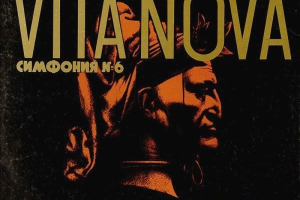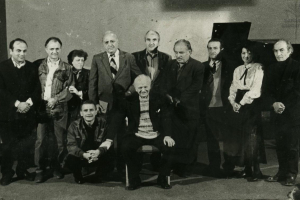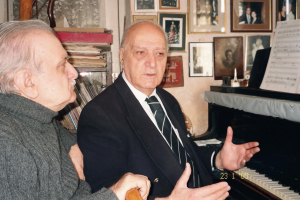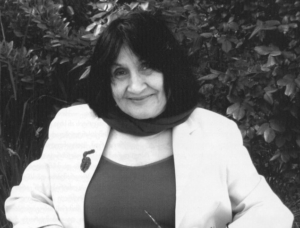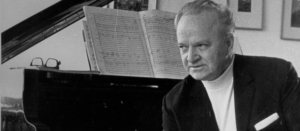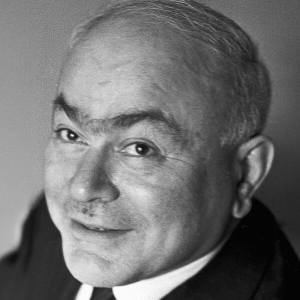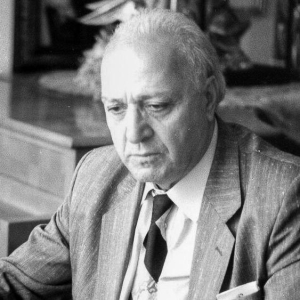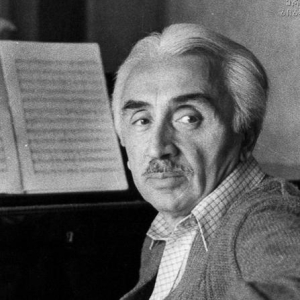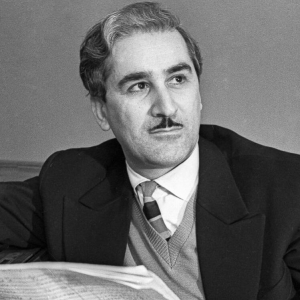Felix
Glonti
Felix Glonti
(1927 – 2012)
Felix (Philip) Ghlonti is a Georgian Composer and Teacher. People’s Artist of the Georgia (1988), Laureate of the State Award.
Date of birth – November 8, 1927
Place of birth – Batumi, Georgia
Date of death – August 29, 2012
Place of death – Moscow, Russian Federation
He is buried in Didube Pantheon of Writers and Public Figures – Tbilisi
BIOGRAPHICAL DATA
1950 – 1953 – N. Rimsky–Korsakov Leningrad State Conservatory (composition – teacher with K. Kushnarev);
1955 – Returns to Georgia and graduates from Vano Sarajishvili Tbilisi State Conservatory, majoring in composition under the direction of Iona Tuskia;
1955 – Engages in an active creative life;
Since 1978, teacher at the Tbilisi State Conservatory named after Vano Sarajishvili;
AWARDS AND RECOGNITION
Awarded with various prizes. Among them: the State Prize of the Council of Ministers of Georgia, the Power Station Prize of the USA, the Union Prize, for the ballet “Dawn” (1967), the 1st Prize of the III International Composers Competition named after Prokofiev (1999).
1991 – 2012 – Creative Union of Composers of Georgia, permanent member of the board
1979 – Honored Art Worker of Georgia
1988 – People’s Artist of Georgia
1992 – State Prize of Georgia
1999 – Order of Honor – For his great personal contribution to the development of Georgian Musical Art, for his fruitful creative, pedagogical and public work
Felix Glonti
(1927 – 2012)
SELECTED WORKS
MUSIC FOR THE THEATER
1970 – “The Iberians” – Opera In 4 Acts – (Libretto – G. Leonidze)
1976 – “Cleopatra” – Opera In 4 Acts – (Libretto – R. Tabukashvili)
1967 – “Dawn” – Ballet In 2 Acts – (Libretto – V. Chabukiani)
ORCHESTRAL MUSIC
1961 – Symphony No. 1 – “World Horizons”
1967 – Symphony N 2
1969 – Symphony N 3
1971 – Symphony N 4
1974 – Symphony N 5
1979 – Symphony N 6 – “Vita Nova” – for Mezzo-Soprano and Symphonic Orchestra
1981 – Symphony N 7 – “Fiat Lux” – for Choir and Large Symphonic Orchestra (text – Dante)
1982 – Symphony N 8 – “Symphonic Groups, Their Invariants And Representations” – for Large Symphonic Orchestra
1983 – Symphony N 9 – for Electric Piano and Large Symphonic Orchestra
1984 – Symphony N 10 – “Pax Humana” – for Soloists, Choir, Reader and Large Symphonic Orchestra (text – L. Bakhtrioneli)
1987 – Symphony N 11 – “Mundus Apertus – “The Open World”
1989 – Symphony N 12 – Symphony-Liturgy – for Soprano, Baritone, Choir and Large Symphonic Orchestra
1957 – “Fate of Kartli” – Symphonic Poem
1974 – “Romantic Symphony”
1954 – Concerto for Piano and Symphonic Orchestra N 1
2002 – Concerto for Piano and Symphonic Orchestra N 3
1976 – Concerto for Harp and Symphonic Orchestra
1977 – Concert-Symphony – “Symphonic Meditations by F. On the Theme of Petrarch” – for Cello and Large Symphonic Orchestra
1981 – Symphony-Concertante for Piano and Large Symphonic Orchestra
1985 – Concerto for Cello and Symphonic Orchestra – Concerto-Grosso “Metamorphoses of Life”
1998 – Symphony-Concertante – “Years of Travel” – for Piano and Large Symphony Orchestra
1999 – Symphony-Concertante – “Marienbad Elegy” – for Cello and Large Symphony Orchestra
VOCAL AND VOCAL-INSTRUMENTAL MUSIC
1977 – “Iberian Hymns” – Choral Cycle For Mixed Choir a Cappella – for Cello and Large Symphonic Orchestra – (text – from Georgian Hymnographic Poetry of the 5th – 11th centuries)
1977 – “Heroic Oratorio” (“Galaktion”) – for Soloist, Mixed Choir and Symphonic Orchestra – (text – G. Tabidze)
CHAMBER-INSTRUMENTAL MUSIC
1953 – String Quartet No. 1
1985 – String Quartet N 2
1987 – Music for Strings
1967 – 10 Choreographic Engravings for Piano
FILM AND THEATER MUSIC
AUTHOR OF MORE THAN 40 PLAYS.
FILMOGRAPHY
1961 – “Ball and Field” – director – Karaman (Guguli) Mgeladze
1962 – “Alaverdoba” – director – Giorgi Shengelaya
1962 – “White Girl” – director – Leila Gordeladze
1965 – “Gildo” – director – Giorgi Shengelaya
1962 – “I see the sun” – director – Lana Gogoberidze
1977 – “Life of Ermile” – director – Nikoloz Sanishvili
Felix Glonti
(1927 – 2012)
Felix Glonti’s works are fascinating aspects of Georgian professional music. Glonti is a remarkable artist whose explorations are directed by a single goal: to search for assimilation into universal human culture. It has nothing to do with cosmopolitanism. It is impossible for every person on our earth to create just native, typical for his tradition, and unique for him.
The composer’s attitude towards music in general comes from ancient cultures and mediaeval artists’ teachings, where music was considered in the context of the world’s cosmic, mystical dimension. Felix Ghlonti considers music through the perspective of modern, natural sciences. He uses theoretical physics and algebraic laws to produce the sound effects, the work, the form, and the structure in order to convey the idea of the work.
Literature is one way of assimilating into global society. His works are influenced by the works of writers and thinkers from various eras and countries, including Plato, Dante, Petrarch, Shakespeare, and Bruno. Glonti is a monumentalist composer. The attitude of his vision distinguishes him, and the majority of his works are monumental compositions.
Felix Glonti’s works include 12 symphonies, 5 symphonies-concerts, the symphonic poem “Bedi Kartlisa,” 2 operas, the ballet “Gantiadi,” the oratorio “Heroic Oratorio-Galaktion,” the choral cycle “Iberian Hymns” for A cappella mixed choir, music theatrical performances, and soundtracks for movies.
The composer first gained public attention in the 1960s, when his symphony No. 1 “World Horizons” was performed (the premiere was in Tbilisi in 1965, followed by a performance in Brussels in 1966), and the ballet “Gantiadi” (choreography by Vakhtang Chabukiani) was successfully staged in the Tbilisi Opera and Ballet Theater. However, Ghlonti’s artistic-aesthetic ideals were completely realised in the 1970s. In the 1970s, the composer wrote two operas: “The Iberians,” also known as “Caucasian Parsifal” (libretto by Giorgi Leonidze, 1970), and “Cleopatra” (libretto by Revaz Tabukashvili, according to William Shakespeare, 1976). Both operas are completely different representations of Georgian opera art due to their genre, dramatic understanding, and musical language. “In the work of Felix Glonti, and especially in the opera-mystery “The Iberians,” comments singer Nodar Andghuladze, “such depths of the Georgian national musical worldview are brought out, which are found exclusively in the works of this composer, and achieve distinct contours and importance.” The Tbilisi Opera Theater’s Artistic Board reviewed the opera “The Iberians.” It was decided to performe it, but this wasn’t done.
The end of the 1970s (1979) is associated with one of Glonti’s best compositions, symphony N6 “Vita Nova” (“New Life”), based on Dante Alleghieri’s lyrics. Nato Zhgenti, a musicologist and researcher of Glonti’s work, noted: “Vita Nova” is the source of the ideas that provide the aesthetic support of his artistic approach. This unique sound-spatial aesthetics involves the use of a universal symphonic model in order to be realised. At this point, the composer’s viewpoint in regard to the representation of time and place is revealed, as he strives for the harmony of various sounds. During this time, Ghlonti produced an important work, a sample of a symphony- concert titled “Meditations on the Theme of Francesco Petrarca” for cello and orchestra (the premiere was performed in Prague in 1977).
The pieces composed in the 1980s illustrate the composer’s search for the connection of theoretical physics and music, as decided by existential philosophy. Symphony No. 10 “Pax Humana” (“World of Humans”) for grand symphony orchestra, soloists, chorus, and readers, on poems by Lado Bakhtrioneli and Symphony No. 11 “Mundus Apertus. The Open Word” – “Open World” are based on the concept of the world’s “Cosmic-poetic mood” (1987).
Glonti’s modernist aesthetics can also be found in 1990s works. “Your “Marienbad Elegy,” which I am conducting, is a perfect example of modernist music,” German conductor Hans Primberhardt wrote to the composer about the symphony-concert.
The symphony-concerts written during this period are a sort of synthesis of the composer’s many years of numerous discoveries, implying the coexistence of monumental and chamber realms, universal and individual, lyrical, spontaneous and rational beginnings.
Felix Glonti had several success in Georgia and abroad during his creative life, but his musical legacy awaits the musician, researcher, listener…
Musicologist
Tamar Tsulukidze
English Language Translator
Tamar Kharadze




